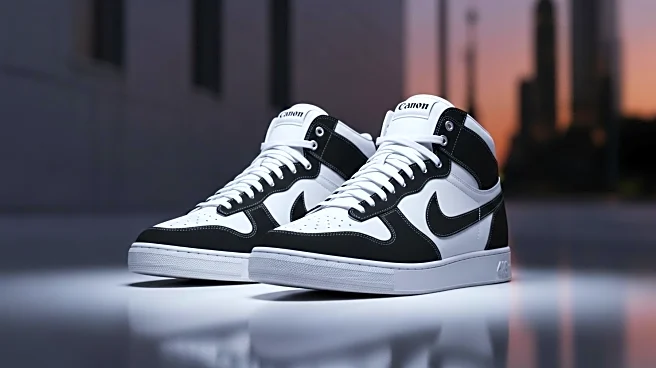What's Happening?
Joe Foster, co-founder of the global sportswear brand Reebok, reflects on the company's journey from a small factory in Bolton, Greater Manchester, to becoming a major player in the U.S. market. Foster, who joined the family business J.W. Foster and Sons in 1952, helped establish Reebok with his brother Jeff in 1958. The brand's breakthrough in the U.S. came after receiving positive reviews in Runner's World magazine, leading to a surge in popularity. Reebok's success was further cemented when actress Jane Fonda began using their shoes in her aerobics videos, transforming the company into a $900 million women's aerobics brand. Foster's story is featured in an exhibition at Bolton Library, highlighting the origins of Reebok and its impact on the sportswear industry.
Why It's Important?
Reebok's rise to prominence in the U.S. market underscores the importance of strategic branding and product placement in the sportswear industry. The company's ability to pivot from a running shoe brand to a lifestyle and aerobics brand demonstrates adaptability and market responsiveness. This transformation not only expanded Reebok's consumer base but also influenced fashion trends, as aerobics became a cultural phenomenon. The brand's legacy continues to impact the sportswear market, with its historical roots serving as a testament to innovation and entrepreneurship. The exhibition at Bolton Library offers insights into the brand's evolution and its significance in the global sportswear landscape.
What's Next?
Joe Foster expresses hope that Reebok will return to its local roots in Bolton, despite being acquired by American firm Authentic Brands Group. The potential return could revitalize local industry and strengthen community ties. As the exhibition runs until January 18, it may inspire discussions on preserving heritage brands and their contributions to local economies. Stakeholders, including local government and business leaders, might explore opportunities to leverage Reebok's legacy for regional development. The exhibition also highlights the broader narrative of sportswear innovation, potentially influencing future industry trends.
Beyond the Headlines
The story of Reebok's founding and growth offers deeper insights into the dynamics of family businesses and their role in shaping industry standards. The ethical considerations of maintaining brand heritage while adapting to modern market demands are crucial for sustaining legacy brands. Additionally, the cultural impact of Reebok's aerobics shoes reflects broader societal shifts towards fitness and wellness, highlighting the intersection of fashion and lifestyle. The exhibition serves as a reminder of the importance of preserving industrial history and its influence on contemporary business practices.









